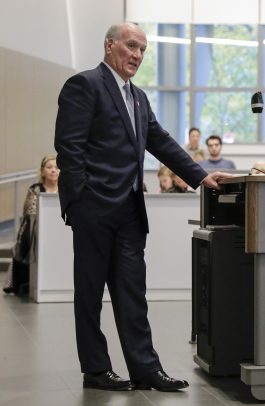Daley: It’s ‘good business’ for business to be a good social partner

Academic and Residential Complex. Photo: Joshua Clark
Between the time that William “Bill” Daley served as President Bill Clinton’s secretary of commerce and when he served as President Barack Obama’s chief of staff, the internet had taken over the world and completely changed the way business and politics were conducted.
Daley, who gave the Wiewel Lecture on Economic Development at the University of Illinois at Chicago on Oct. 23, tapped into his extensive background at the crossroads of business and politics to speak to about 100 people, including students, faculty, elected officials and family members.
In his lecture, “Corporations & Humanity: Why They Belong Together,” Daley focused on how the role of corporations had shifted because of technology and the rise in social media that made companies — as well as political leaders — more accountable more quickly.
“I did have the honor and the pleasure of serving in two presidential administrations…they were only separated by eight years but in some ways, it could have been 80 years,” Daley said.
During his speech, Daley recalled how many older political and economic leaders were pushed aside for failing to confront technological changes after the initial “dot.com” boom in the late 1990s that led to too many players and unrealistic expectations. By the mid-2000s, the internet was firmly in place, while companies that had put their heads in the sand were quickly left behind.
“To be honest, I think they were a little overwhelmed by a thing called the internet and the speed of change,” he said.
Daley, who had spent the day speaking with hundreds of UIC students, said he was impressed with the students but also implored them to embrace change and be adaptable.
“To those students that may be here, I welcome you to the 21st century, where the speed of change is accelerating by the day and the job you are preparing for today may not be here tomorrow,” Daley said. “But the education you are receiving will prepare you to adapt, and that is the key to your future.”
Daley, who referred to himself a “pro-business Democrat,” said throughout his decades spent at the intersection of business and politics, he has never seen a stranger time than now and said that trust in government, business and the media were at all-time lows.
He said that the same polarization had divided people and pushed them into believing that only the extremes — socialism or unregulated capitalism — were the only choices.
“With one side, you’re a Republican defending big business no matter how badly they act, where on the other side are Democrats attacking capitalism no matter how many people it might help,” Daley said.
Daley has held high-level executive positions, including vice chairman with oversight of government affairs, philanthropy and social responsibility for BNY Mellon; managing partner and head of U.S. Operations for Argentière Capital; vice chair and chairman of the Midwest region and head of corporate responsibility at JPMorgan Chase, and president of SBC Communications.
He noted that the current political polarization on concerns such as climate change, LGBTQ issues and social justice has forced companies to take the lead. He referenced a recent major statement by the nonprofit Business Roundtable, whose members are made up of the CEOs of major U.S. companies, that said that rather than focus solely on “shareholder wealth maximization,” businesses should have a positive impact on society.
“Profits and the public interest are not mutually exclusive. They can and must, for our future, go together,” he said. “Over the past several decades, corporations have shifted too far from the humanity side of this equation.”
He called on companies to invest in their employees, support their local communities, protect the environment through sustainable practices, treat suppliers ethically and fairly, and deliver value to their customers. He said that creating an inclusive economy not only promotes social cohesion, but it also was “good business.”
“Pay your employees well, give them health care so they don’t live in fear for an emergency that can cause bankruptcy, help them pay for college and save for retirement, and they will be more productive,” he said. “Give them a sense of financial security and more of them will start businesses themselves, take risks and dream of new products and ideas for their employers. That’s how our economy grows.”
Daley’s lecture coincided with the announcement that he had chosen to make UIC the repository for his collection of papers and artifacts, which are now publicly available. His papers joined those of his father, Richard J. Daley, and his brother, Richard M. Daley, which are also available to researchers and students in the Special Collections and University Archives of his father’s namesake Richard J. Daley Library.
“[UIC] has turned into what my father truly dreamed this campus and this university could be,” said Daley, who spoke at the newly built Academic and Residential Complex. “My dad always believed that working Chicagoans should have easy access to higher education, he believed that education was the path to the middle class.”
The UIC Wiewel Lecture on Economic Development was made possible by a gift to the College of Urban Planning and Public Affairs and the College of Business Administration. The event was co-sponsored by the University Library and the UIC John Marshall Law School.
Categories
